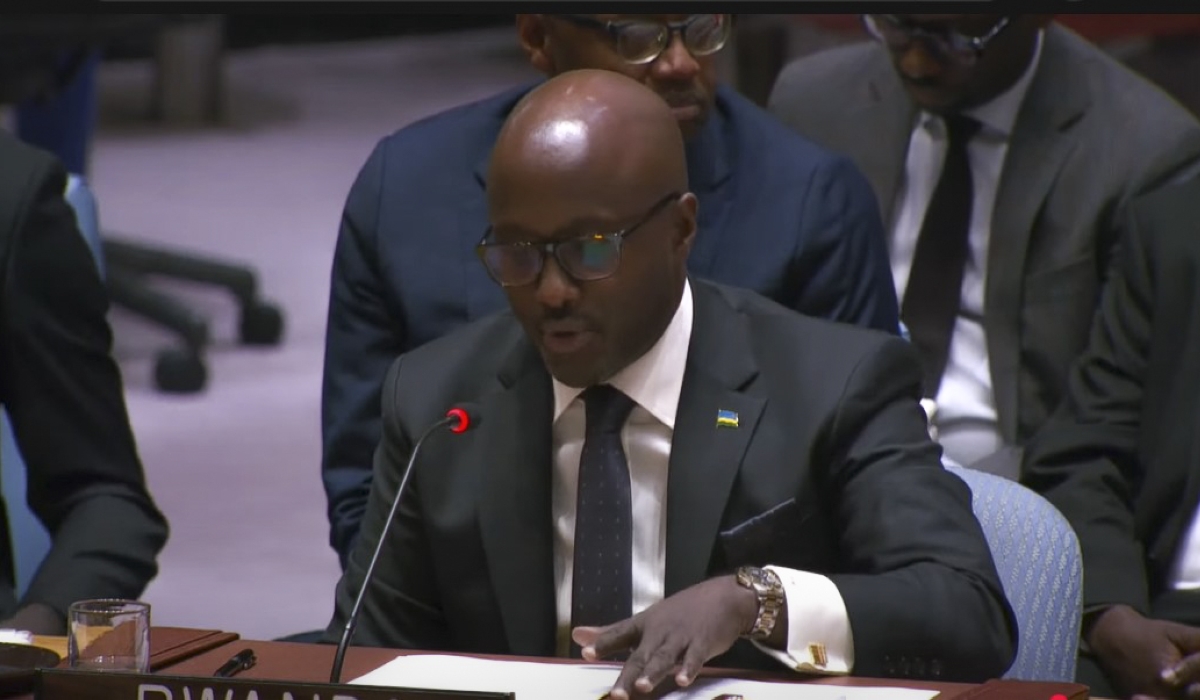
Rwanda suggests five actions to strengthen Africa’s fight against terrorism
During a high-level UN Security Council debate in New York on Tuesday, January 21, Rwanda’s foreign minister, Ambassador Olivier Nduhungirehe, emphasized that the international community cannot hope to confront the issue of terrorism if it does not identify and punish its genuine culprits.
Nduhungirehe emphasized that the Congolese government has shamefully “chosen to divert attention from this real terrorist threat by labelling another movement, the M23 – which is a group fighting to protect a persecuted Congolese community – as a terrorist organization” in spite of the “clear and present danger.”
He underlined that the meeting is of the utmost importance during the debate on “African-led and development-focused counterterrorism: strengthening African leadership and implementation of counter-terrorism initiatives,” He said that the proliferation of terrorism in Africa, especially in sub-Saharan Africa, is a concerning and enduring problem.
“We encounter a variety of difficulties. To increase their power, terrorist organizations take advantage of poor government, inequality, poverty, and unsolved disputes. The issue is exacerbated by the inadequate capabilities of security agencies and the porous borders of many African countries.
Furthermore, collective attempts to successfully address these concerns have been impeded by the lack of sufficient money and coordination among African governments.
In order to combat terrorism, Rwanda has sent troops to Mozambique and the Central African Republic (CAR) in recent years.
Nduhungirehe emphasized the need for the international community to make sure that counterterrorism initiatives are founded on fairness, justice, and a sincere desire for peace.
According to him, mislabeling organizations or disregarding structural inequities only serves to prolong violent cycles and erodes the legitimacy of our group’s efforts. According to him, Rwanda suggests five specific actions to improve African leadership in counterterrorism initiatives.
Nduhungirehe listed the following five steps:
1. Increase the operating capabilities of AU
“We must significantly enhance the operational and logistical capacities of African Union peacekeeping forces” and regional security frameworks like the Multinational Joint Task Force and the G5 Sahel, the minister stated first.
According to him, this entails giving African police specific training, cutting-edge gear, and long-term funding so they can successfully stop and address terrorist threats. In 2018, Rwanda donated US$1 million to support the operationalization of the G5 Sahel Joint Force in solidarity with Sahelian nations, amidst a lack of money and coordination among African states that hindered collective efforts to effectively confront challenges.
“We continue to stand with the people of the Sahel as they face the devastating threat of terrorism, and this contribution was a demonstration of our commitment to regional solidarity.”
La Force conjointe du G5 Sahel “FC-G5S” (G5 Sahel Joint Force) was created in 2017 in response to the growth of violent and armed extremist organizations and the worsening security conditions in the area, which includes Burkina Faso, Chad, Mali, Mauritania, and Niger.
According to the minister, Rwanda’s partnership with Mozambique provides a powerful illustration of how bilateral African cooperation can highlight the potential of customized, situation-specific initiatives.
Since these arrangements have been effective in tackling the problem of terrorism in certain impacted member states, the Security Council and the international community need to promote and assist them.
The security situation has much improved since Rwanda sent troops to the northernmost province of Mozambique, Cabo Delgado, in July 2021.
Among the many significant accomplishments of Rwandan and Mozambican security forces are the seizure of terrorist strongholds in strategic districts such as Mocimboa da Praia, Palma, and Muidumbe; the protection of vital road networks that link districts in northern Mozambique; and the safe repatriation of more than 600,000 internally displaced people (IDPs) to their homes. In previously damaged areas, the combined troops also assisted in the restoration of essential services including marketplaces, schools, and medical facilities.
Kigali made the decision to reinforce the 1,000 troops who were already in Mozambique in 2021 with an extra 2,500 troops in order to build on these successes and show “our unwavering commitment to ensuring peace and stability in the region.”
2. Include counterterrorism in projects related to government and development.
Second, Nduhungirehe stated that efforts related to governance and development must be included with counterterrorism efforts.
He said that areas with high rates of unemployment, poverty, and a lack of essential services are breeding grounds for terrorism.
“Programs for sustainable development that tackle the underlying roots of extremism require our investment. The governance flaws that terrorists use to foment division and garner support must be addressed by governments.
3. Enhancing the Peace and Security Framework in Africa
Third, he stated that “We must continue strengthening” the African Peace and Security Architecture (APSA), which is a collection of laws, policies, and institutions aimed at preventing conflicts and advancing peace and security throughout the continent.
He clarified that in order for APSA to continue to solidify, institutional structures must be completely functional and prepared to offer prompt, locally specific answers.
According to him, raising funds for the African Union Peace Fund (AUPF) and other initiatives will strengthen Africa’s sovereignty over its security issues and lessen reliance on outside donors. In June 1993, the AUPF was created as one of the operational instruments to fund the Organization for African Unity’s (OAU) peace and security initiatives.
4. Give regional collaboration top priority.
Rwanda’s fourth tangible measure is to give regional collaboration and information exchange top priority.
Nduhungirehe clarified that in order to respond quickly and cooperatively to cross-border threats, African countries must set up safe routes for intelligence collection.
Partnerships with foreign friends who can help in resource mobilization and capacity-building should also be a component of this cooperative strategy, he added.
5. Avoidance
Lastly, he stated that prevention had to be “at the heart of our strategy”.
In order to combat violent extremism, governments must put early intervention programs into place that emphasize community resilience and youth development, he added.
Addressing concerns that radicals take advantage of can be accomplished by promoting inclusivity, tolerance, and respect for human rights through grassroots activities. “Nduhungirehe said.”
“These interventions must be driven by our shared responsibility as Africans to ensure that terrorism does not derail the aspirations of our continent’s people.”
“Rwanda is still dedicated to tackling this escalating threat in collaboration with regional and global partners. We can create a safer and more secure continent for all if we concentrate on the underlying causes of terrorism, bolster resilience, and assist African-led projects.”
All Categories
Recent Posts
Tags
+13162306000
zoneyetu@yahoo.com



